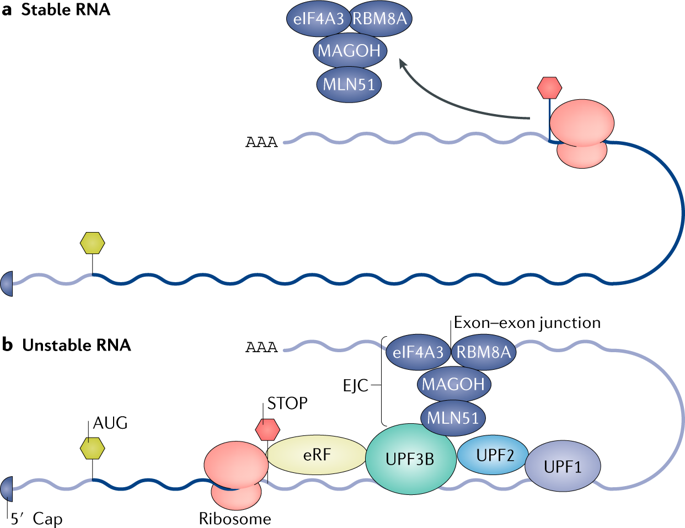当前位置:
X-MOL 学术
›
Nat. Rev. Neurosci.
›
论文详情
Our official English website, www.x-mol.net, welcomes your
feedback! (Note: you will need to create a separate account there.)
Nonsense-mediated RNA decay in the brain: emerging modulator of neural development and disease.
Nature Reviews Neuroscience ( IF 28.7 ) Pub Date : 2018-12-01 , DOI: 10.1038/s41583-018-0079-z Samie R Jaffrey 1 , Miles F Wilkinson 2
Nature Reviews Neuroscience ( IF 28.7 ) Pub Date : 2018-12-01 , DOI: 10.1038/s41583-018-0079-z Samie R Jaffrey 1 , Miles F Wilkinson 2
Affiliation

|
Steady-state RNA levels are controlled by the balance between RNA synthesis and RNA turnover. A selective RNA turnover mechanism that has received recent attention in neurons is nonsense-mediated RNA decay (NMD). NMD has been shown to influence neural development, neural stem cell differentiation decisions, axon guidance and synaptic plasticity. In humans, NMD factor gene mutations cause some forms of intellectual disability and are associated with neurodevelopmental disorders, including schizophrenia and autism spectrum disorder. Impairments in NMD are linked to neurodegenerative disorders, including amyotrophic lateral sclerosis. We discuss these findings, their clinical implications and challenges for the future.
中文翻译:

大脑中无义介导的 RNA 衰变:神经发育和疾病的新兴调节剂。
稳态 RNA 水平由 RNA 合成和 RNA 周转之间的平衡控制。最近在神经元中受到关注的选择性 RNA 周转机制是无义介导的 RNA 衰减(NMD)。 NMD 已被证明可以影响神经发育、神经干细胞分化决策、轴突引导和突触可塑性。在人类中,NMD 因子基因突变会导致某些形式的智力障碍,并与神经发育障碍相关,包括精神分裂症和自闭症谱系障碍。 NMD 损伤与神经退行性疾病有关,包括肌萎缩侧索硬化症。我们讨论这些发现、它们的临床意义和未来的挑战。
更新日期:2019-01-26
中文翻译:

大脑中无义介导的 RNA 衰变:神经发育和疾病的新兴调节剂。
稳态 RNA 水平由 RNA 合成和 RNA 周转之间的平衡控制。最近在神经元中受到关注的选择性 RNA 周转机制是无义介导的 RNA 衰减(NMD)。 NMD 已被证明可以影响神经发育、神经干细胞分化决策、轴突引导和突触可塑性。在人类中,NMD 因子基因突变会导致某些形式的智力障碍,并与神经发育障碍相关,包括精神分裂症和自闭症谱系障碍。 NMD 损伤与神经退行性疾病有关,包括肌萎缩侧索硬化症。我们讨论这些发现、它们的临床意义和未来的挑战。































 京公网安备 11010802027423号
京公网安备 11010802027423号